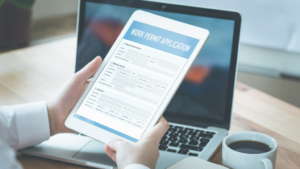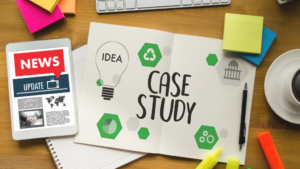The HR industry has always been about managing people but in recent times things have changed a lot, this is mainly because of AI in HR(AI).
AI in HR is changing the way HR professionals operate. These smart algorithms help HR professionals do their jobs better by making things more efficient, using data to make decisions, and improving how employees feel at work.
From recruitment to employee management, it can execute multiple tasks. In this article, we’ll explore the profound impact of AI in HR and how it’s reshaping the way organizations recruit, retain, and develop talent.
Streamlining The Recruitment Processes
One of the most significant impacts of AI in HR is seen in recruitment processes.
Traditionally, sorting through resumes and identifying the best candidates for a job position has been a time-consuming and labor-intensive task.
AI-Powered tools, such as applicant tracking systems (ATS) and AI-driven recruitment platforms, are now automating various aspects of recruitment, including resume screening, candidate sourcing, and conducting initial interviews.
These AI systems use machine learning algorithms to analyze resumes and job descriptions, identifying patterns and matching candidates with job requirements more efficiently than human recruiters.
By automating repetitive tasks, you can focus your time and energy on building relationships with candidates and making strategic hiring decisions.
AI in HR is also enabling HR departments to tap into new talent pools and reach candidates who may have been overlooked through traditional recruitment methods. For example, AI algorithms can scan online professional networks, social media platforms, and other digital channels to identify passive candidates with relevant skills and experiences.
Enhancing Employee Experience
AI is also crucial in enhancing the employee experience within organizations. Employee engagement and satisfaction are vital factors in maintaining a productive workforce, and AI-powered tools are helping HR departments better understand and address the needs of their employees.
For example, sentiment analysis algorithms can analyze employee feedback from surveys, performance reviews, and social media channels to gauge overall morale and identify areas for improvement.
AI-driven chatbots provide employees with instant access to information and support, whether it’s answering HR-related questions, assisting with benefits enrollment, or providing training resources.
Moreover, AI in HR can personalize the employee experience by tailoring benefits packages, wellness programs, and career development opportunities to individual preferences and needs. By leveraging data analytics and predictive modeling, HR professionals can anticipate employee needs and proactively address issues before they impact morale and productivity.
Personalizing Learning and Development
In today’s fast-paced business environment, continuous learning and development are essential for both individual career growth and organizational success. AI is enabling HR departments to personalize learning experiences for employees by leveraging data analytics and predictive modeling.
AI in HR can analyze employee performance data, career goals, and learning preferences to recommend relevant training programs, courses, and development opportunities tailored to each employee’s needs. This personalized approach not only increases employee engagement and satisfaction but also fosters a culture of continuous learning within the organization.
Furthermore, AI-powered adaptive learning platforms can dynamically adjust the pace and content of training programs based on individual learning styles and progress. This ensures that employees receive the most relevant and effective learning experiences, maximizing their potential for skill acquisition and professional growth.
Remote Work and Virtual Collaboration
The rise of remote work has accelerated the adoption of AI-powered tools for virtual collaboration, communication, and team management. From virtual meeting assistants to AI-driven project management platforms, these tools facilitate seamless collaboration among remote teams, enabling HR professionals to effectively manage distributed workforces and maintain employee productivity.
Predictive Analytics for Talent Management
Predictive analytics is another area where AI is revolutionizing HR practices. By analyzing large volumes of data, including employee performance metrics, turnover rates, and market trends, AI algorithms can predict future workforce trends and identify potential talent gaps within the organization.
HR professionals can use these insights to develop strategic workforce planning strategies, such as succession planning, talent acquisition, and skills development initiatives. By proactively addressing talent management challenges, organizations can better position themselves for future growth and success.
Moreover, AI can help identify high-potential employees and provide targeted development opportunities to nurture their talents and leadership skills. By investing in the growth and development of top performers, organizations can build a strong pipeline of future leaders and drive long-term business success.
Performance Management
Traditional performance management processes often rely on annual reviews and subjective evaluations, which can be ineffective and demotivating for employees. Machine learning is transforming performance management by enabling continuous feedback, data-driven evaluations, and predictive analytics.
ML-powered performance management systems can collect and analyze real-time data on employee performance, including key metrics, milestones, and peer feedback. This allows for more frequent and meaningful performance discussions between managers and employees, fostering a culture of transparency and accountability.
Mitigating Bias in Decision-Making
One of the most significant advantages of AI in HR is its potential to mitigate bias in decision-making processes. Human bias, whether conscious or unconscious, can significantly impact recruitment, performance evaluations, and other HR practices. AI algorithms, however, can analyze data objectively and make data-driven decisions, reducing the risk of bias.
However, it’s essential to note that AI is not immune to bias itself. Biases can inadvertently be introduced through biased training data or flawed algorithms. Therefore, it’s crucial for organizations to continuously monitor and evaluate AI systems to ensure fairness and transparency in HR practices.
HR Analytics and Strategic Decision-Making
Data has become the lifeblood of modern HR management, providing valuable insights into workforce trends, demographics, and behavior. AI-powered analytics tools are revolutionizing the way HR professionals leverage data to inform strategic decision-making.
AI algorithms can analyze vast amounts of HR data to identify patterns, trends, and correlations that might otherwise go unnoticed. From predicting future talent needs to optimizing workforce allocation, these insights enable HR leaders to make data-driven decisions that align with organizational goals and objectives.
Moreover, AI-driven predictive modeling can forecast the impact of various HR initiatives and interventions, allowing organizations to anticipate potential outcomes and optimize their strategies accordingly. By harnessing the power of AI and analytics, HR professionals can drive meaningful change and create a more agile and adaptive workforce.
Conclusion
In conclusion, Artificial Intelligence is reshaping the HR industry in profound ways, from revolutionizing recruitment processes and enhancing employee experience to enabling predictive analytics and mitigating bias in decision-making.
While AI-powered tools offer tremendous opportunities for efficiency and innovation, organizations need to strike a balance between leveraging technology and preserving the human touch in HR practices. By embracing AI responsibly, HR professionals can unlock the full potential of their workforce and drive sustainable business success in the digital age.







